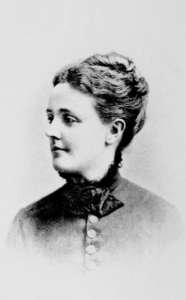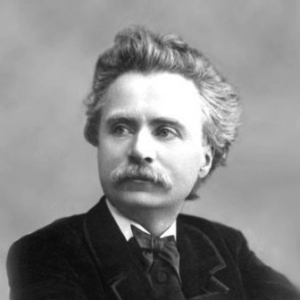REVIEW POTPOURRI: Sarah Orne Jewett
 by Peter Cates
by Peter Cates
Sarah Orne Jewett
The October 1904, Atlantic Monthly, out of Boston, Massachusetts, had an article, The Art of Miss Jewett, on South Berwick Maine’s own Sarah Orne Jewett (1849 – 1909) , via which Charles Miner Thompson (1864-1941) stated the following:
“…I always think of her as of one who, hearing New England accused of being a bleak land without beauty, passes confidently over the snow, and by the gray rock, and past the dark fir tree, to a southern bank, and there, brushing away the decayed leaves, triumphantly shows to the faultfinder a spray of the trailing arbutus. And I should like, for my own part, to add this: that the fragrant, retiring, exquisite flower, which I think she would say is the symbol of New England virtue, is the symbol also of her own modest and delightful art.”
Thompson’s statement might be encrusted by a bit too much purple scrub brush prose but he did show a discerning appreciation of a writer for her gifts at endowing the “bleak land…gray rock…[and] decayed leaves ” of our Pine Tree State and conveying its own special beauties and truths in this at times very scary universe.
As with William Faulkner’s hot dusty roads in Mississippi and Willa Cather’s Nebraska wheat fields, Jewett’s Southern Maine was transformed into a microcosm that resonated with so many readers.
In her short story collection The Country of the Pointed Firs, one story in particular, The Flight of Betsey Lane, has an opening paragraph that conveys in its simple narrative just how much Miss Jewett absorbed into her “little piece of dirt” in Southern Maine (She lived in South Berwick most of her life and, as a child, traveled with her father on his rounds as a country doctor.); since it’s too long to quote in its entirety, I offer a few sentences that hopefully will convey the spirit of the author :
“One windy morning in May, three old women sat together near an open window in the shed chamber of Byfleet Poor-house. The wind was from the northwest, but their window faced the southeast, and they were only visited by an occasional waft of fresh air.
“There was a cheerful feeling of activity, and even an air of comfort, about the Byfleet Poor-house. Almost every one was possessed of a most interesting past, though there was less to be said about the future.
“There was a sharp-faced, hard-worked young widow with seven children, who was an exception to the general level of society, because she deplored the change in her fortunes. The older women regarded her with suspicion, and were apt to talk about her in moments like this, when they happened to sit together at their work.”
Faulkner wrote, “A writer needs three things – experience, observation and imagination, any one or two of which can supply the lack of the others.”
Willa Cather, who was a friend, wrote of Sarah Orne Jewett, “She early learned to love her country for what it was. What is quite as important, she saw it as it was. She happened to have the right nature, the right temperament, to see it so- and to understand by intuition the deeper meaning of all she saw.”
Edvard Grieg
An RCA Victor cassette contains Edvard Grieg’s a minor Piano Concerto and two of his solo Lyric Pieces; and the Concerto of Robert Schumann, also in a minor, as performed by Artur Rubinstein, with Alfred Wallenstein conducting a studio pickup orchestra for the Grieg and Carlo Maria Giulini directing the Chicago Symphony in the Schumann.
Rubinstein played with his wondrously expressive musicianship that he brought to a wide range of composers from Mozart and Beethoven to Tchaikovsky and Rachmaninoff and they can be heard via YouTube. He could at odd moments smother the music with his personalized individuality but in general he conveyed the spirit of each composer in his many recordings.
.
Responsible journalism is hard work!
It is also expensive!
If you enjoy reading The Town Line and the good news we bring you each week, would you consider a donation to help us continue the work we’re doing?
The Town Line is a 501(c)(3) nonprofit private foundation, and all donations are tax deductible under the Internal Revenue Service code.
To help, please visit our online donation page or mail a check payable to The Town Line, PO Box 89, South China, ME 04358. Your contribution is appreciated!




Leave a Reply
Want to join the discussion?Feel free to contribute!